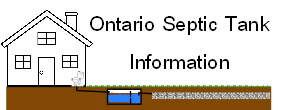No, we want to see the health of the existing sewage to determine if it is working properly. Also, concrete septic tanks rarely fail below the water line. It is above the water line where the hydrogen sulphide reacts with the concrete and creating an unsafe structural condition.
Yes, as long as the tank and trenches are close to the surface because heat from the sewage will prevent the frost from going to deep. If the tank and trenches are deeper then 2′ though it could be more difficult.
No. The only way to properly conduct a stress test is by putting the correct amount of water into the treatment/disposal system over a full 24-48 hour period and this simply can’t be achieved in the time of a typical inspection. A stress test also won’t provide good information about how oxygen is moving through the system and if the bacteria are working properly.
Yes. Provided that the inspector is familiar with the technology by either becoming authorized by the manufacturer or attending educational classes concerning advanced treatment units.
Although we can provide an assumption of how long the system would last if current use conditions were to continue, we can not guarantee that a system will last x number of years because of the inability to monitor the system for proper maintenance and care in the future. Requesting a guarantee is similar to asking your mechanic to guarantee that your car will not get into an accident. We all know that cars get into accidents primarily based on poor operators and it is the exact same thing with septic systems.
By looking at the septic tank alone you can only see if the system HAS failed, not if it is GOING to fail. The actual septic tank is rarely the only component of the system that needs to be replaced once the system fails. 95% of the time the failure occurs in the treatment bed which is the most expensive part to repair. A full system inspection will tell you if or when the system is going to fail, which is the real answer most people are after.
We are not entirely sure, but it may have to do with the fact that most pumping companies only pump the tank and don’t specialize in inspections and repairs. Other companies only specialize in excavating and installing new systems and may not have the tools necessary for conducting a full inspection.
Most septic tank additives are simply pH adjusters and may or may not have helped the system. An inspection will determine how effective they have been and if the additive should be used in the future.
